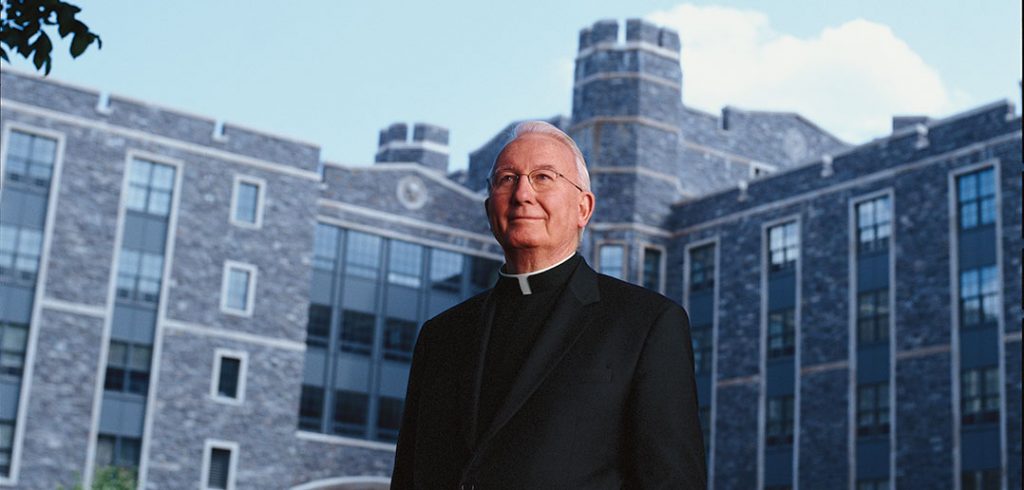Father O’Hare succeeded James C. Finlay, S.J., on July 1, 1984, to become the 31st president of Fordham University. He held that position for 19 years, making him the longest-serving president in Fordham’s history when he stepped down on June 30, 2003. His tenure marked a period of dramatic growth for Fordham: Applications soared in number; the student body grew academically stronger and more diverse; residential and academic space expanded; and the University exceeded the goal of its first comprehensive fundraising campaign, the crowning achievement of which was the creation of the William D. Walsh Family Library on the Rose Hill campus.
“Having served as Fordham’s president for some time—though not as long as Father O’Hare—I have some insight into, and a deep appreciation for, how gifted he was as a leader, a communicator, and a pastor,” said Joseph M. McShane, S.J., who succeeded Father O’Hare as president of Fordham. “He placed all of his considerable intellect, integrity, and vision in service of the University, and in doing so transformed Fordham into a powerhouse of Jesuit education. We will miss his wisdom, steady counsel, and warm wit.”
Robert D. Daleo, GABELLI ’72, chair of the University’s Board of Trustees, said the Fordham community owes Father O’Hare “a debt of gratitude for his long and singular service.”
“Father O’Hare led the University for 19 years, and despite some tough financial times, began Fordham’s rebirth as a national university,” he said.
Bronx Roots
A bit of an outsider to academia, Father O’Hare was working as the editor in chief of America, the Jesuit journal of opinion, when he was recruited for the presidency by Fordham’s Board of Trustees.
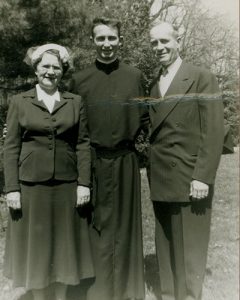
But the son of first-generation Irish Americans was hardly an outsider to Fordham, the Bronx, or to Catholic education. He was born on February 12, 1931, to Joseph, a New York City mounted police officer, and Marie, a schoolteacher, who raised their family in the close-knit Irish community of Tremont, just two miles from the Rose Hill campus. He attended Regis High School in Manhattan.
In a video tribute to Father O’Hare when he received the Fordham Founder’s Award in 2003, friends, teachers, and siblings recalled the young Joe O’Hare as a well-loved classmate with an easy demeanor, a straight-A student, and a natural storyteller. Although his exploratory forays into theater and basketball at Regis met with success, it was the priesthood that ultimately called to him: Upon graduating from high school in 1948, he joined the Society of Jesus.
Jesuit Formation
That decision, Father O’Hare told The New York Times, was largely inspired by the work of John Corridan, S.J., and the labor priests of the 1940s New York waterfront. “It’s not an otherworldly kind of spirituality,” Father O’Hare said of the Jesuits’ active faith. “It’s the kind very geared to involvement in the present time.”
The young Jesuit-in-training was sent to the Philippines, where he earned his bachelor’s and master’s degrees at Berchmans College in Cebu City. From 1955 to 1958 and again from 1967 to 1972, he served on the faculty at Ateneo de Manila University.
Edmundo Martinez, S.J., recalled being a student of Father O’Hare’s in the 1950s.
‘Those were heady days of youth’s idealism for the search of truth, and goodness, and beauty—ideals that rubbed off on us principally, for myself at least, from Joe O’Hare,” said Father Martinez, co-founder, chaplain, and teacher at the Ingenium School in the Philippines. “Like Socrates and his friends, we would sit around in class and discuss such topics as the medieval universities, with Joe leading us on to ever deeper levels and ever wider ranges of meaning.”
Between teaching posts, Father O’Hare returned to the United States, earning licentiate degrees in philosophy and theology in the early 1960s from Woodstock College in Maryland and a doctorate in philosophy from Fordham in 1968. He was ordained a Roman Catholic priest in 1961 in the Fordham University Church.
Fordham Presidency
Sixteen years after his doctoral studies, he left his post at America and was back at Fordham—this time in the Office of the President.
“He made the transition seamlessly,” said Leo O’Donovan, S.J., president emeritus of Georgetown University. “At a time of major discussion between the Vatican and American Catholic universities on the mission of Catholic education,” he said, “he was one of the foremost advocates of fidelity to both true Catholicity and true university freedom of thought and research.”
His presidency took shape just as the Bronx itself was undergoing an economic and cultural comeback from its worst period of blight. Under Father O’Hare’s leadership, Fordham experienced a comeback too. In two decades, the school’s growth exceeded national trends, moving from a school largely attended by commuters to a university with a vibrant campus life and an increasingly national and diverse student body. The number of undergraduate applicants tripled.
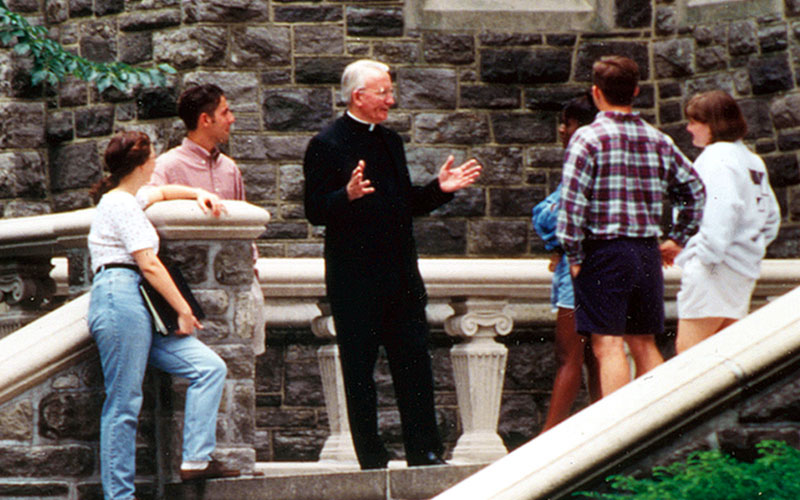
The school’s endowment rose from $36.5 million to $271.6 million, enabling the addition of approximately 1.1 million square feet of academic and residential space, and the renovation of more than 1 million square feet of existing space on the Lincoln Center and Rose Hill campuses. Four new residence halls were built at Rose Hill, including Millennium Hall, opened in 2000 and later renamed O’Hare Hall. The Lincoln Center campus saw the addition of its first residence—the 20-story McMahon Hall—in 1993.
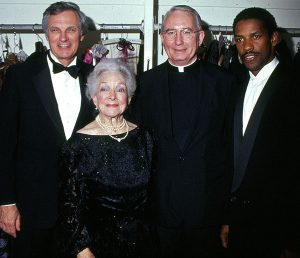
In 1991, the University’s sesquicentennial year, Father O’Hare announced the launch of a $150 million fundraising campaign—the largest of its kind at the time for a Jesuit university. Nearly one-quarter of all alumni contributed, and more than two-thirds of funds raised came from individuals, many of whom had no previous connection to the University. The campaign helped to create 170 endowed scholarships as well as several new faculty chairs. Fordham surpassed its goal by $5.6 million.
One of the campaign’s many successes—and one of Father O’Hare’s outstanding legacies—was the construction of the Walsh Family Library, a world-class facility that opened in 1997 at Rose Hill and was subsequently ranked No. 6 in the country in the Princeton Review.
Robert Campbell, GABELLI ’55, former vice chairman of Johnson & Johnson who served as Fordham’s board chair during much of the 1990s, said that as a leader, Father O’Hare showed a “willingness to take risks.” He recalled Father O’Hare telling him that Fordham had been talking about building a new library for 50 years.
“He went to the board with it and they went along,” he said. “It was very symbolic, because it was tied to a major campaign and because it said Fordham’s on the move. New York was a tough place, and we were there to compete with anyone.”
Campbell said Father O’Hare’s determination was complemented by “his sincerity and his sense of humor that always came through.”
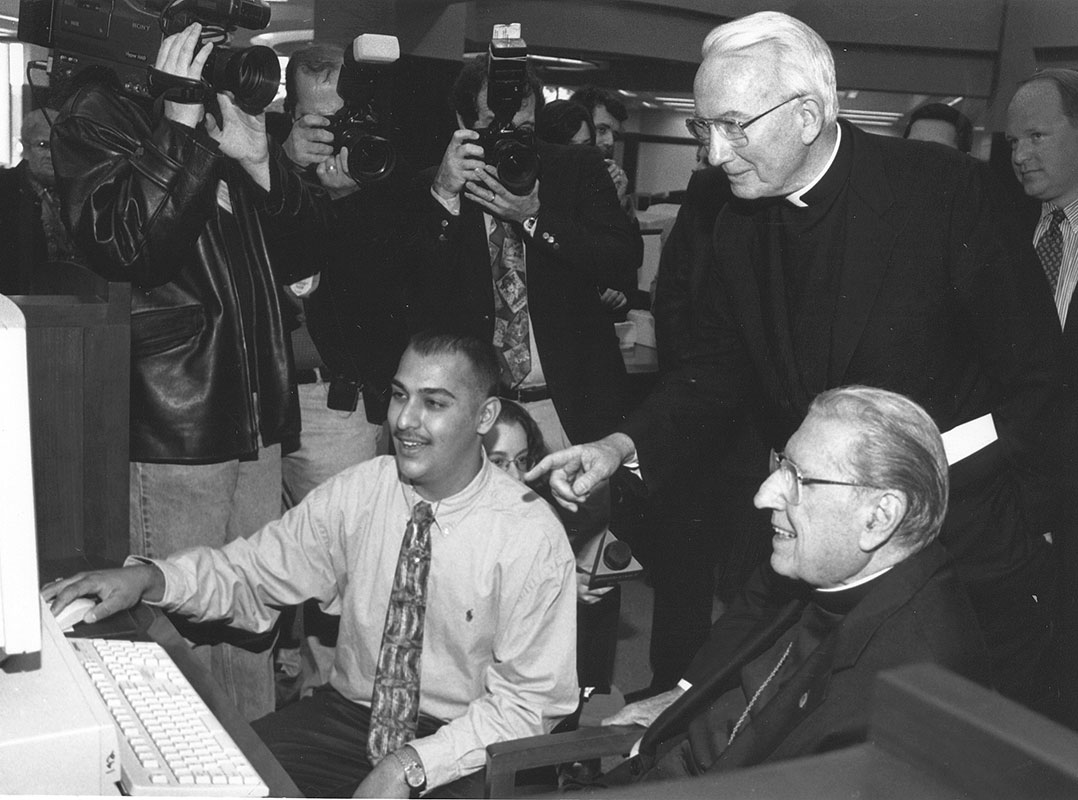
As a native New Yorker and a Jesuit committed to social justice, Father O’Hare saw great potential in a stronger unification of Fordham’s two New York City campuses, which he helped achieve through the restructuring of faculty and adoption of a shared core curriculum. He felt that each location had much to teach students.
“Fordham men and women have found in the city rich cultural resources, but also daunting moral and social challenges, soaring celebrations of the human spirit here at Lincoln Center, but also a summons to service in the neighborhoods of the Bronx. These different faces of the city engage the classical Renaissance humanism of Jesuit education, but also the new Jesuit humanism that adds to this classic ideal the urgency of education for justice,” he said at Fordham’s 160th Anniversary Dinner at the New York State Theater in 2002.
Influence and Reach
Father O’Hare’s influence extended far beyond Fordham and New York City in many ways, not least of which are the accomplishments of those who worked for him.
“In his 19 years as president, he helped mentor many Fordham colleagues into their own presidencies, including me,” said Fordham Trustee Donna Carroll, Ph.D., University secretary under Father O’Hare and current president of Dominican University in Chicago. “He said something to me once that guides me still: ‘You choose to see the limits or the possibility in Catholic higher education. What you choose determines how you lead.’”
Demonstrating a commitment to Fordham’s many Catholic traditions, Father O’Hare helped establish Fordham’s Center for American Catholic Studies, the Institute of International Humanitarian Affairs, and the Laurence J. McGinley Chair in Religion and Society, for which he recruited Avery Dulles, S.J. (before he was elevated to cardinal). He made many international trips in service to Fordham and the Jesuits, traveling to 26 countries during his presidency.
Principled Civic Leadership
Father O’Hare devoted equal time to forging Fordham’s relationships with New York City. In 1988, Mayor Edward I. Koch made him the founding chair of the New York City Campaign Finance Board, one of the nation’s groundbreaking models for campaign finance reform. So ethical was Father O’Hare’s leadership, said Mayor Koch, that the board even fined his mayoral staff for errors made in campaign contribution reporting. Father O’Hare held the position for 15 years. In late 1993, Mayor David N. Dinkins refused to reappoint Father O’Hare after the board fined the Dinkins campaign $320,000. But Mayor Rudolph Giuliani reappointed him when he took office in 1994.
“It could’ve been a nothing job if it didn’t have a superb leader willing to take on every person in politics,” said Mayor Koch. “He made the job.”
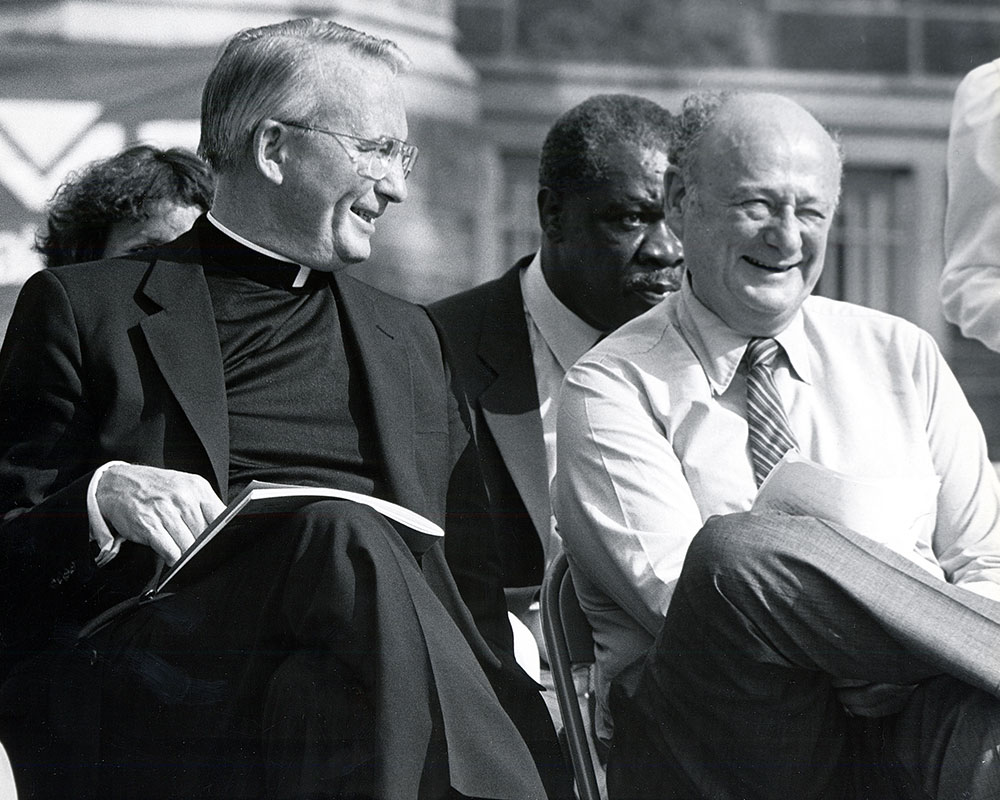
U.S. Supreme Court Justice Sonia Sotomayor worked with Father O’Hare as one of the Campaign Finance Board’s founding appointees.
“Father O’Hare is one of my heroes,” said Sotomayor, a Bronx native who has remained close to Fordham, receiving an honorary degree at 2014’s commencement and attending many University events. “Brilliant, witty, kind, gentle but firm, he lived his life caring and giving to so many. The nation, the city of New York, and the Bronx have lost a great man. I have lost a friend I greatly admired but whose principles continue to guide my life.”
Former Mayor Michael Bloomberg praised Father O’Hare for his integrity.
“Father O’Hare not only began a renaissance at Fordham, he helped clean up corruption in city politics as the founding chair of the Campaign Finance Board,” Bloomberg said. “Appointing him to that post was one of Mayor Koch’s best decisions. He was scrupulously honest, fiercely independent, and never afraid to speak his mind, even when it rubbed elected officials the wrong way. Thanks to him, the city’s public matching funds program, which I was glad to expand, became a national model. In a city of legendary Irish pols, one of the very best never ran for office—but he left a mark on politics like no other.”
Mayor Koch joined several celebrities, religious leaders, and alumni to pay tribute to Father O’Hare when he received the 2003 Fordham Founder’s Award. Present were Cardinal Edward Egan; Cardinal Dulles; best-selling author and Fordham alumna Mary Higgins Clark; CBS newsman and Fordham alumnus Charles Osgood; and Fordham’s incoming 32nd president, Father McShane.
Accepting the award, Father O’Hare—a proud Irishman and humorist—characterized the ceremony.
“It’s something like an Irish wake,” he joked. “Everybody should have one before they die.”
Fordham’s Pastor
Father O’Hare was more than the University president; he was Fordham’s chief pastor and storyteller. During his tenure, he celebrated more than 7,000 Masses, including a Mass of Remembrance and Hope following the attacks on September 11, 2001, which killed three Fordham students and 36 alumni. He performed countless nuptials, burials, and baptisms for members of the Fordham community. He awarded more than 60,000 diplomas and cheered at more than 900 athletics events.
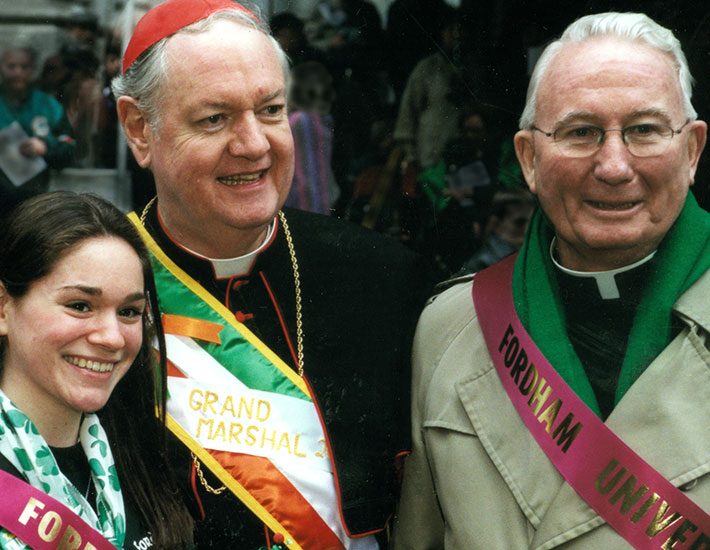
John Feerick, dean emeritus of Fordham Law, recalled Father O’Hare’s pastoral and professional support.
“Father O’Hare meant everything to me when I served as dean of the Law School. He supported me in difficult moments and was always a wise counselor on academic issues and public service undertakings. We owe much to him for the success the school enjoys today,” Feerick said.
“More personally, I will always remember that he was on the altar when my parents died and 10 years later when my brother Donald died. And how can I forget the many times we walked alongside each other in St. Patrick’s Day parades? I watched people wave and call out to him as he waved back with a smile, all while maintaining his quick stride. In everything he was insightful and brought to every occasion a wonderful sense of humor. I will greatly miss him as I had no other friend like him.”
After he stepped down as president in 2003, Father O’Hare served for one year as president of Regis High School, his alma mater. He then returned to the staff of America as associate editor, retiring in 2009. In 2015, with Fordham as a co-sponsor, the magazine established the Joseph A. O’Hare, S.J., Postgraduate Media Fellowship in his honor.
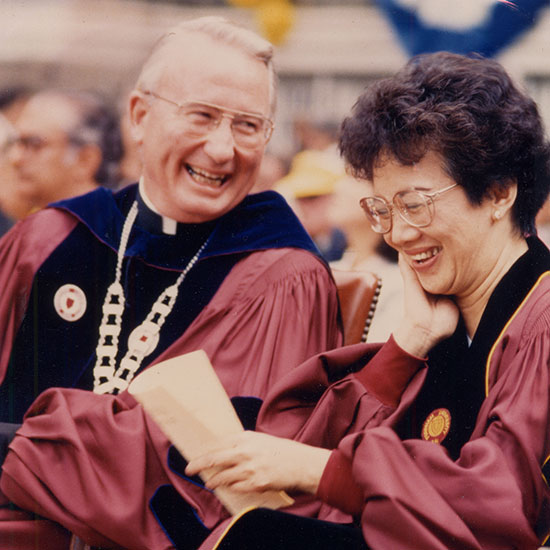
Father O’Hare was the recipient of 11 honorary degrees, including one from Fordham. He served as chairman of both the Association of Catholic Colleges and Universities and the Association of Jesuit Colleges and Universities, a trustee of the Asia Society, and a member of the Charter Revision Commission of the City of New York, among other appointments. For his contributions to the city, he received the 1992 Civil Leadership Award from the Citizens Union of New York. Legendary New York Post columnist Jack Newfield called Father O’Hare “the conscience of campaign finance reform and walking gravitas,” ranking him 44th on a list of “New York’s 50 Most Powerful People” in 1997.
A few years before he left his post as president, Father O’Hare spoke to radio listeners about St. Ignatius Loyola, founder of the Jesuits: “I have always preferred the image of Ignatius the Pilgrim to Ignatius the Soldier,” he said on WFUV’s Fordham Focus on July 30, 2000. “Ignatius the Pilgrim undertook a journey to seek the will of God, searching to discern what the greater glory of God demanded of him and his companions. Such a search, of course, will always challenge the status quo. What has been and what is can never exhaust the vision of what could be and what should be.”
Father O’Hare was preceded in death by his parents; his brother, Gerard O’Hare; and his sister, Marie Scesney. He is survived by nine nieces and nephews and several great-nieces and nephews. A private burial will be held in Jesuit Cemetery, Auriesville, New York. Once the present health crisis has passed, a memorial Mass for Father O’Hare will be celebrated in the University Church. Contributions in his honor may be made to the Joseph A. O’Hare Endowed Scholarship Fund at Fordham. Notes of condolence may be mailed to his niece Claire Scesney Lundahl at 247 East 77 Street, Apt. 5C, New York, NY 10075.
Additional Tributes to Father O’Hare
The Rev. Edward A. “Monk” Molloy, C.S.C., President Emeritus, Notre Dame
Joe O’Hare was a multifaceted leader—as priest, editor, writer, and teacher. Blessed with a great sense of humor, he was a person of vision with a strong international perspective and a deep commitment to Gospel values and human rights. He and I had some wonderful adventures together. He will be deeply missed.
The Rev. John Cecero, S.J., Provincial of the Jesuits’ USA Northeast Province
Father O’Hare was president of Fordham when I began my tenure as an assistant professor of psychology at the University. I had only known him previously through his work as editor in chief of America magazine, and despite his lofty pedigree as a widely respected intellectual, institutional chief executive, and civic leader in New York City campaign reform, he humbly and graciously welcomed me as a new Fordham Jesuit to meet with him to discuss my preliminary research interests and even to solicit some funding to support them! Joe led with insight, wit, and uncompromising loyalty to the Society of Jesus and our mission in higher education, and I will always be grateful for the inspiration that he imparted to me and to so many other Jesuits and lay colleagues at Fordham University.
Paul Guenther, FCRH ’62, Former President of Paine Webber, Former Chairman of the New York Philharmonic, and Former Chair of Fordham’s Board of Trustees
Whenever Joe O’Hare was present, there was an aura which everyone felt. He was an iconic New Yorker, a pastor, and a friend.
Tom Kane, GABELLI ’61, Retired Investment Banker, Former Fordham Board Chair
My long friendship with Father Joe O’Hare began when I joined the Fordham board as a trustee in 1986. We kept a friendly banter going between our two alma maters, Regis and Xavier high schools, throughout our time together.
In 1986, after joining the board, my wife, Judy, and I traveled to Manila for a reception hosted by a fellow trustee, Jose Fernandez, who at the time was minister of finance for the Philippines. The high point of the visit was an audience with the new president, Cory Aquino. Father Joe had been ordained at the Ateneo de Manila and so was friendly with her. (Yes, after the meeting, we did get a Cook’s tour of the shoe collection of Imelda Marcos.)
During the visit, Father O’Hare issued an invitation for President Aquino to visit Fordham while in New York for the opening of the U.N. in September. She graciously accepted.
With the ascension of Mrs. Aquino to the presidency, Philippine nationalism in the world became renowned. On September 22, 1986, Fordham held a special convocation in honor of President Aquino’s visit to Rose Hill. She was presented with an honorary doctorate.
Edwards Parade was packed with Filipinos and Filipino Americans numbering in the thousands and bedecked with yellow ribbons and scarves. The press estimated the crowd at 5,000. When they spotted President Aquino, they went wild with celebration and chanted her name—Cory, Cory! The air was electric.
Gathering himself for a few moments, Father O’Hare then began his remarks in fluent Tagalog, and spoke for over five minutes before switching over to English. To say the crowd went wild with emotion at Joe’s linguistic gesture would be a massive understatement.
Jeffrey Gray, Fordham’s Senior Vice President for Student Affairs
Tall with broad shoulders and a gray mane, regal and striking in appearance, Father O’Hare was a towering figure on campus, in the world of New York City politics, and in the Society of Jesus globally. Anyone who met Joe O’Hare was left with the impression that he could carry the world on his shoulders. A man of unmatched intellect, and personal and professional substance and depth, he was a confident, independent, deep-thinking, and fearless leader who never backed down from a challenge or a challenger. He was a proud New Yorker and man of great loyalty, with a mischievous streak and well developed, wry sense of humor.
Brian Byrne, Former Vice President for Fordham’s Lincoln Center Campus
Father O’Hare grew in his role as University president over his long tenure and in turn grew those who worked closely with him. He had an astonishingly flexible intellect, mastering not only the nuances of the academic world but also the game of politics in his tenure as the first chair of the New York City Campaign Finance Board and president of the Commission of Independent Colleges and Universities.
As a Jesuit priest, however, he always kept his priorities in order. I remember a critical visit to the Albany power brokers with other university presidents which was delayed because Father O’Hare had promised to say Mass in a local parish. He was a student of the ironic in life, frequently noting his tendency to tell the world how it should behave yet remaining firm in his commitment to advance fairness and civility.
Bruno M. Santonocito, Former Fordham Vice President for Development and University Relations
Father O’Hare’s 19-year presidency set in motion some of the foundational steps that have led to the extraordinary success Fordham University enjoys today. He revitalized and reengaged the alumni community’s commitment to Fordham. He spent numerous hours with alumni either individually or at small gatherings or when giving his state of the University message to the various alumni chapters around the country and abroad. Through these activities, Father was able to recruit an active and involved Board of Trustees who were critical to the successful completion of the Fordham University Campaign in our sesquicentennial year.
He loved rubbing shoulders with our graduates who talked about him affectionately as “the priest from central casting.” And when he was with our alumni what was always on display was his charm and graciousness, his warmth, quick wit, sense of humor and mastery of the good joke and the good story. Father had style, delivery, and timing!
Finally, he had loyalty to and affection for all his vice presidents. In spite of that, he could not resist telling alumni that like a herd of elephants or a gaggle of geese, he had a “confusion” of vice presidents.
Simply put, Father O’Hare was the right man at the right time for Fordham and I feel privileged to have shared a good part of his tenure at his side.
Dorothy Marinucci, Associate Vice President for Presidential Operations
There was a brilliant Jesuit, Father John Donohue, S.J., who worked for many years as an associate editor at America magazine. He was a good friend of Father O’Hare. Whenever you visited Father Donohue as you were leaving he would say, “safe home.” I know Father O’Hare particularly liked this phrase. I know no more fitting tribute than to quote Father Donohue and say, “Safe home, JO’H.”
Nicole A. Gordon, Faculty Director of the CUNY Baruch College Executive M.P.A. program and Distinguished Lecturer of Public Affairs; Founding Executive Director of New York City’s Campaign Finance Board
Father O’Hare was the inspired choice of Mayor Ed Koch to be the founding chair of the pioneer New York City Campaign Finance Board in 1988.
The public record truly speaks for itself, including the many times when our board chair had to face off against powerful interests. Each time, Father O’Hare challenged efforts to intimidate and undermine the board, and in each instance, he prevailed. These occasions included attempts by elected officials to replace him as chair, to move the board’s offices to uninhabitable quarters, to stop valid matching funds checks to candidates, and to stack the board with a new member in the midst of public hearings on apparent (and, later, confirmed) substantial violations of the campaign finance law.
One wonderful exchange–among many on TV–was aired when a candidate’s spokesperson described how he had hired the most prominent law firm in the City to fight the CFB. Father O’Hare responded, “So, sue me!”.
Working closely with him, as I was privileged to do for some 15 years, was an experience next to none. As a leader of troops, Father O’Hare’s sharp intelligence, political acumen, crushing wit, unquestionable loyalty, and (literally) priestly status gave us daily lessons on how to operate in public and in private, especially when the job is to be independent and fair in a volatile arena and without natural allies.
Would that we had him with us now.

